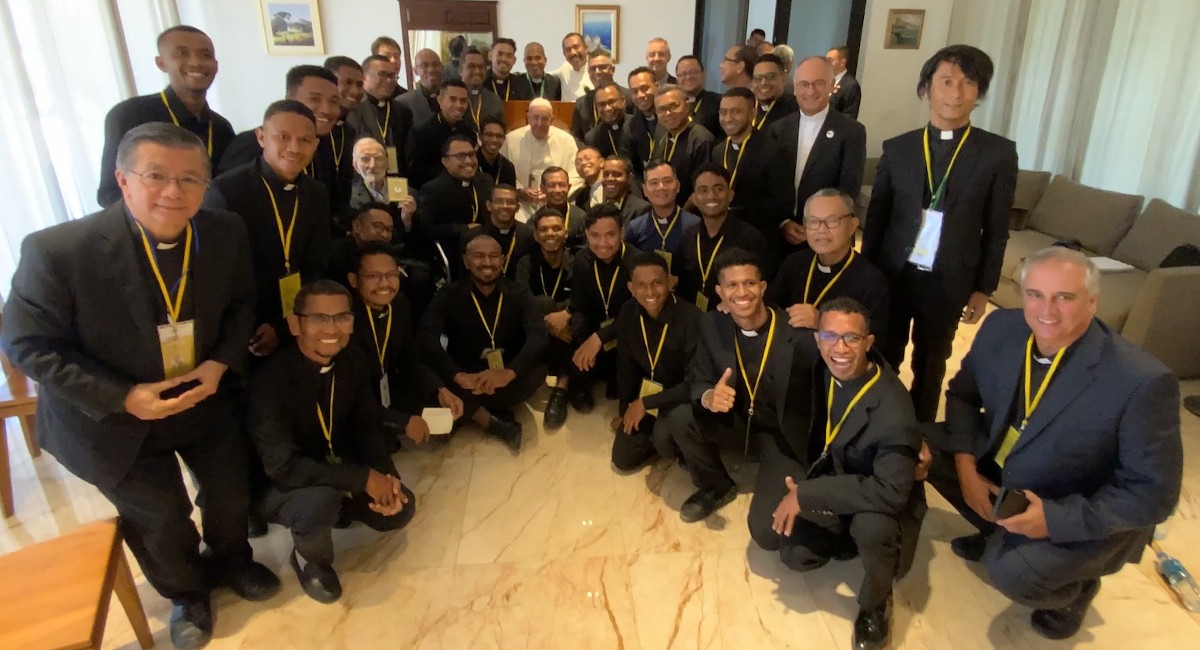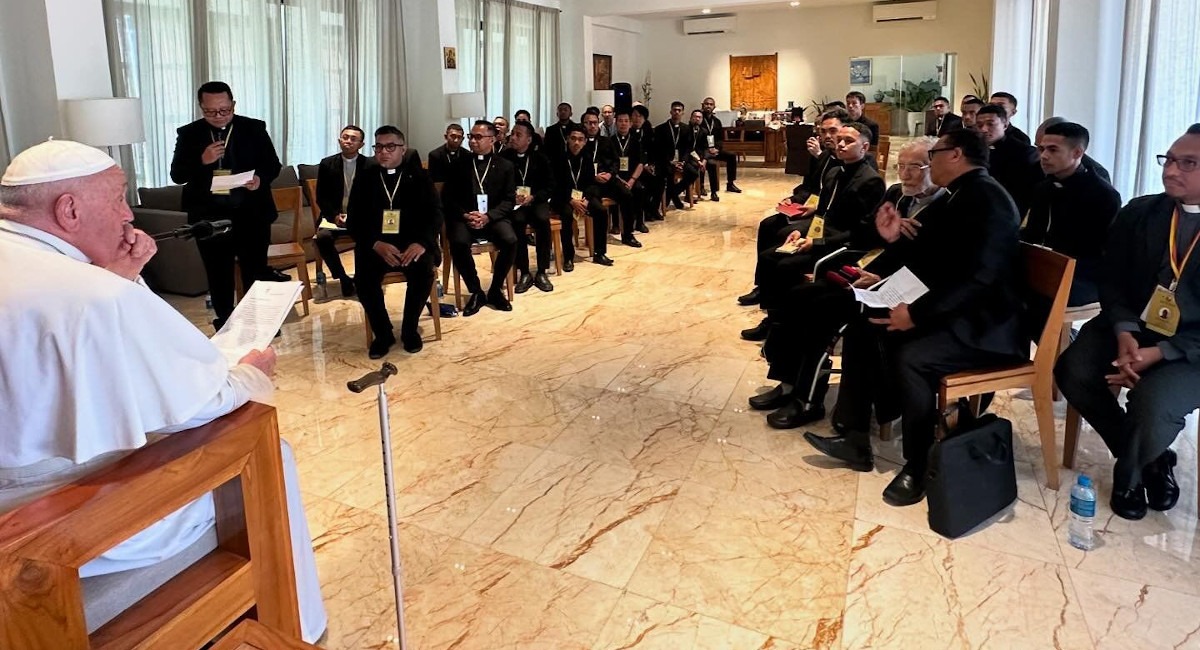
Pope Francis with some 42 Jesuits serving in Timor-Leste
Pope Francis’ visit to Timor-Leste couldn’t have come at a more momentous time for the Jesuits, who this year are celebrating the 125th anniversary of the first Jesuit mission in the country. The Pope’s visit offered an opportunity for reflection on the Jesuits’ contributions to Timor-Leste’s nation-building, particularly in the fields of education, social service, and pastoral work.
During an intimate meeting with his confreres on 10 September, Pope Francis sat in a chair that was made from the timbers of the old church in Soibada, built by the Jesuits in 1905. Also present at the meeting was Fr João Felgueiras SJ, who, at 103 years old, is the longest-serving missionary from Portugal and personally knew the first Jesuit missionaries. It was an encounter that bridged the past with the present. The transcript of Pope Francis’ conversation with the local Jesuits was published on 24 September by the Italian Jesuit journal La Civiltà Cattolica.
When the Holy Father was asked what key areas the Jesuits in Timor-Leste should prioritise in their apostolic mission in light of the global challenges facing the Church today, he urged them to “get away from ecclesial ideologies” and instead be close to the people. “This is the challenge I leave you with: do not turn away from the people who are the most precious asset,” he said.
With a population that is predominantly Catholic and where the majority are under the age of 30, the country is navigating its path to stability and development. This demographic reality has also shaped much of the work of the Jesuits in Timor, both in their spiritual ministry and in education with institutions such as the secondary school Colégio de Santo Inácio de Loiola and the teacher education institute Instituto São João de Brito.
During his conversation with them, Pope Francis cautioned against the dangers of clericalism, which he described as a “culture that destroys the Church.” He called on the Jesuits to reject clericalism by being true pastors to the people, whether they work in universities, parishes, or social services. “You can tell me, ‘I work in the university, among the intellectuals.’ Well, those intellectuals you have there at the university are people. Be shepherds of your people!” he advised.
Pope Francis also reiterated the importance of social justice as an essential and integral part of the Gospel. Reflecting on the Jesuit mission of accompanying the poor and marginalised, he said, “Social justice must take into account the three human languages: the language of the mind, the language of the heart, and the language of the hands. Being an intellectual abstracted from reality is no use in working for social justice; the heart without intellect, no use either; and a language of hands without heart and intellect, no use either.”
He reminded the Jesuits that at the end of their lives, they will not be judged on how often they attended meetings or adhered to strict clerical protocols. Instead, they will be judged by their acts of mercy and love for the least among them. “I was hungry, did you give me food? I was thirsty, did you give me something to drink? I was in prison, did you visit me? I was a fugitive, did you help me?” he said, quoting Christ’s words from the Gospel.
For Fr Calisto Seco SJ, a young priest and the director of Colegio Santo Inacio de Loiola, the encounter with the Pope offered much-needed consolation to remain steadfast in their mission to accompany the young Timorese.
“Pope Francis visited us in a time when we needed him the most. As a country, there are many challenges in the church and government. We need a model in leadership. Many Timorese said, ‘This is the kind of leader we need now, someone who is able to bring together all the Timorese in spite of the many differences,’” he shared.
As an Ignatian educator, Fr Seco found inspiration from the Pope’s words, particularly his reminder to always keep Jesus at the centre of their mission. He said it gave him “a renewed spirit to serve Christ” through his work in education.
The young priest recalled Pope Francis’ address to authorities, civil society, and the diplomatic corps, in which he encouraged them to invest in education.
“You are a young people. I am not referring to your culture and history, which are rather ancient, but to the fact that about 65 percent of Timor-Leste’s population is under the age of thirty,” Pope Francis said.
“This is richness. This statistic tells us that the first area for you to invest in is education… Invest in education within the family and education at school, in an education that puts children and young people at the centre and promotes their dignity.”
[space_20]
Related stories:
Pope Francis in Indonesia, Timor-Leste, and Singapore
Hopes and insights from the Holy Father’s upcoming trip to Asia Pacific







